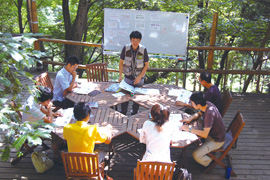The Mitsui & Co. Environment Fund
Introduction to Grant Projects
NPO Whole Earth Institute
Science and environmental education collaboration project
Activity grant
- Project Description
The results of the latest research in the field of natural science are valuable teaching materials for environmental and science education. Methodology on 'how to teach' this information and knowledge has been discussed many times in various forums, but when it comes to 'what to teach', interpreters (nature guides) and school teachers are stuck in their own seperate areas of study, and there has been insufficient collaboration between researchers and educators, meaning that the latest knowledge is not being effectively communicated to society and schools. This project looks to bring together researchers, interpreters, and school teachers in Shizuoka Prefecture to consider better ways to educate in terms of both content and methods, thereby improving the quality of environmental education. Specifically, this will involve holding meetings to coordinate science with environmental education, developing teaching materials made collaboratively by interpreters and researchers, and improving the materials and methodology for communicating natural science knowledge by implementing model initiatives and renting out the developed teaching materials.
- Grant year
- FY2009 Activity Grants
- Grant term
- 3 years
October 2009 - September 2012
- Grant amount
- 14,452,240 yen
- Activity region
- Shizuoka Prefecture, Japan

Overview of the Organization

- Representative
- Toshimichi Hirose, CEO
- Establishment
- 2001
- Establishment purpose
- NPO Whole Earth Institute's parent organization, Whole Earth Nature School, is engaged in activities aimed at building a sustainable society, primarily through nature experience-based environmental education. As part of these activities, it established the NPO Whole Earth Institute in 2002 as a specialist institution to collaborate with various stakeholders, such as companies and government, in order to propose and implement policy that tackles complex global issues.
- Main areas of activity
- All regions of Japan, including bases in Shizuoka Prefecture, Okinawa Prefecture, Niigata Prefecture, Okayama Prefecture, and Hyogo Prefecture
- Staff
- 14 full-time staff members, 10 full members
- Annual operating budget
- 95.52 million yen in 2006, 102.66 million yen in 2007, 142.24 million yen in 2008
- Recent activities
-
- (1) Cultivating environmental education instructors
Training a diverse range of people to be instructors regardless of nationality and whether they are amateur or professional. - (2) Regional and rural revitalization
Devising, planning and implementing regional revitalization activities, primarily nature tours and environmental education initiatives. - (3) Environmental research
Researching programs and mechanisms for resource usage and conservation, surveying trails for foot tread, and conducting research related to program usage. - (4) Eco-tourism research and development
Researching and developing eco-tourism initiatives to boost tourism, and related mechanisms concerning conservation and use. - (5) Policy creation and recommendation
Proposing policy to governments and companies (e.g. eco-tourism promotion regulations, basic act for environmental education, etc.) - (6) International cooperation and support for developing countries
Conducting environmental education in developing countries and accepting inbound participants. - (7) Disaster aid
Building networks for when disasters strike, coordinating volunteers, and caring for children, etc. - (8) Operational support for environmental networks
Supporting the operation of networks such as CONE, JEEF, and F-CONE.
- (1) Cultivating environmental education instructors